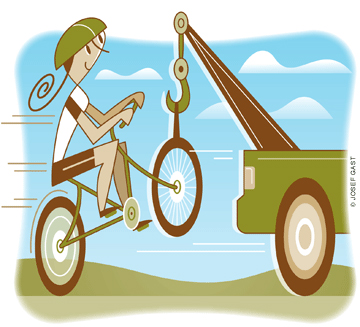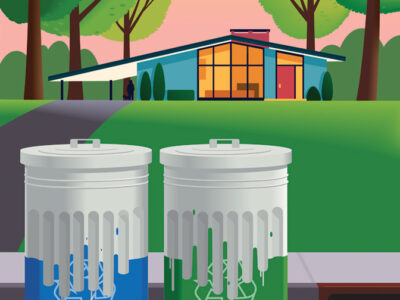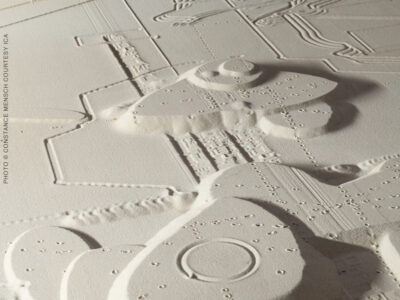
A bicyclist is tooling along on her Raleigh 7-speed when she suddenly hits a rock and pops a tire. It’s a scorching day and a long haul home. So she calls her auto club for help.
Though that may sound like an odd source of bike assistance, Better World Club (BWC) co-founder and president Mitch Rofsky W’72 likes to see his members pedaling.
“You get two service calls a year,” he says. “If they can’t fix your bike, they’ll take you where you want to go. Nobody else does that.”
Along with roadside assistance, the five-year-old company offers most of same services AAA does—including hotel discounts and insurance—but with a green twist. BWC (www.betterworldclub.com) pitches itself as the nation’s only environmentally friendly auto club, and one percent of its revenues goes toward environmental causes, such as the purchase of carbon offsets to mitigate greenhouse-gas emissions.
With 20,000 members, it’s not exactly running the competition off the highways yet. But Rofsky, who once put his social activism to work for Ralph Nader, isn’t daunted by the size difference between his club and the 50-million-member AAA.
“We’ve been around five years and they’ve been around 105 years,” he says, speaking on the phone from Portland, Oregon. “But we’re the fastest growing auto club out there.”
One could say that Rofsky has his Penn liberal-arts education to thank for getting him behind the wheel in the first place. It armed him with enough trivia to compete on game shows like Split Second and The Joker’s Wild while attending UCLA’s law school. His game-show efforts netted him two cars, $700, three cases of root beer, and three cases of Rice-a-Roni. (He kept the AMC Hornet he won and turned in the Ford Pinto for cash. “I was very happy with that move, because the Pinto was actually a dangerous car.”)
After graduating, Rofsky joined Nader’s Public Citizen, working on banking regulation and other issues on Capitol Hill. It was a heady experience for the 24-year-old attorney to interact with U.S. senators, and in the search for allies on both sides of the aisle, he found himself becoming friendlier with some of the Republicans than with the Democrats, whose support came more readily. “You ended up spending a lot of time trying to find Republicans who would also sponsor your legislation or work with you,” he explains.
Rofksy later served as president of Working Assets, a long-distance phone company that donates a percentage of its fees to nonprofits like Greenpeace and Doctors Without Borders. He went on to become president of American Consumer Insurance (now Better World Insurance), which has a similar “progressive” bent.
“I believe that socially responsible businesses can take the lead in showing consumers just what the marketplace can deliver to them,” Rofksy says.
During that time he was approached by environmental groups that were fighting AAA on issues such as the Clean Air Act and mass transit. Inspired by those conversations, he decided to create an organization to compete with AAA. “We have a completely different policy agenda than they have,” Rofsky says. (AAA, unsurprisingly, disagrees. “When a small organization is looking for publicity, a common tactic is to misrepresent the larger, more established competitors’ [record] in order to advance one’s cause,” responded a spokesman, citing environmentally friendly language on mass transit, fuel economy, and climate change in AAA’s energy policy.)
BWC continues to preach the green gospel in Kicking Asphalt, a cheeky newsletter that Rofsky likens to The Onion, and Driving Change, a monthly action alert. It offers discounts on eco-travel and allows members to purchase additional carbon offsets to reduce the environmental effects of their plane or car trips. (In the past, that money funded such projects as replacing Portland schools’ oil-burning furnaces with ones powered by natural gas.)
About 15 percent of Better World’s members drive hybrid cars, (earning a 15 percent discount on their membership fees), but Rofsky says they’re just ordinary people like himself. “I’m not some kind of environmental radical who lives in a treehouse,” he says. “I own a ’92 Infiniti convertible, which I’ve obviously had for many years. I believe that when you have a car that’s working, you don’t need to trade it in and get a new car every two years. But I am waiting for the plug-in hybrids [to come out].”
He waits for other developments, as well. Rofsky would like to see more people on bikes and more public transportation, for gas-guzzlers to give way to fuel-efficient autos, and for America’s dependence on foreign energy to become a thing of the past. Kind of like the Pinto.
—Susan Frith




